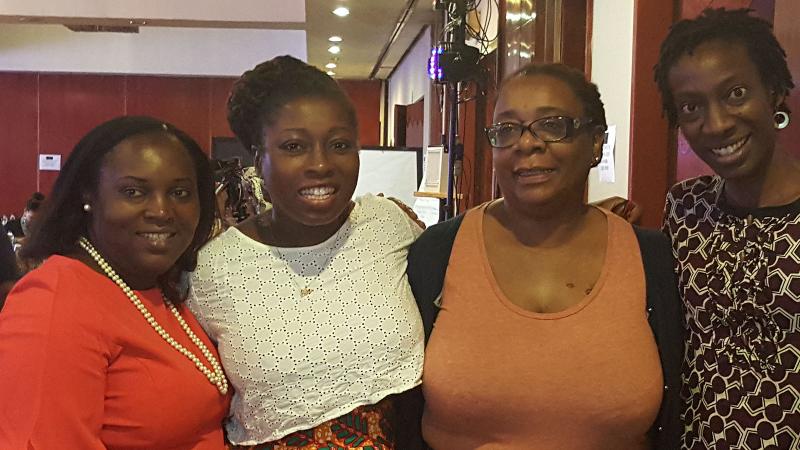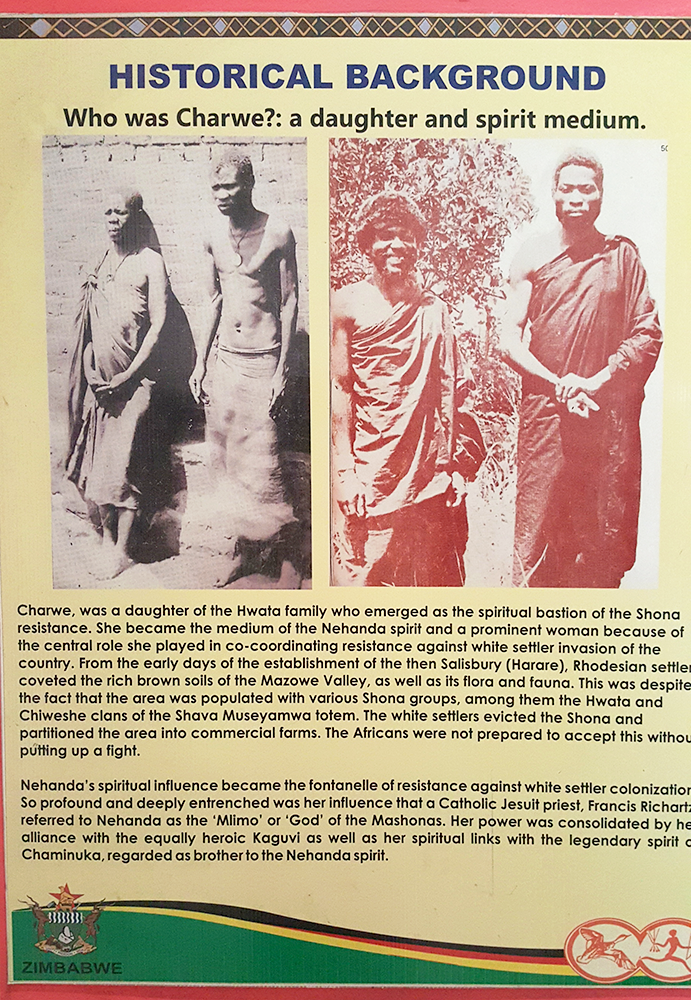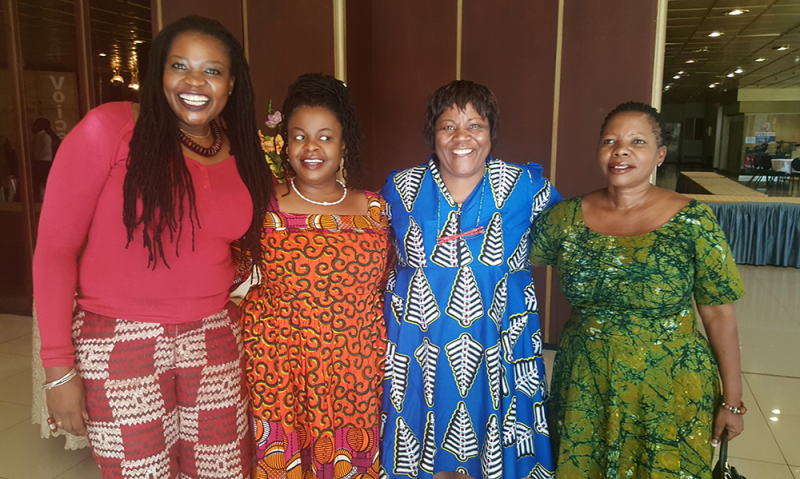On my first day in Zimbabwe I visited the National Museum of Science. Above the doorway of the anteroom hung a picture of Nehanda Charwe Nyakasikana, with the caption ‘MAPFUPA ANGU ACHAMUKA’.
This was translated to me to mean, "my bones will rise". Nehanda was a spirit medium active in the first Zimbabwe Chimurenga [1]. She inspired her people in the liberation struggle, refused to convert to Christianity and was sentenced to death by the colonisers. The story is told that Nehanda went singing and dancing to the gallows declaring, "my bones will rise" to win freedom.

I have always felt strongly that Zimbabwean women embody resistance. Women in Zimbabwe took active part in the liberation struggles for independence as fighters and comrades. In my 2008 interview with Margaret Dongo, a former freedom fighter, she emphasized, “there were no rubber bullets for women”. On the warfront, women and men were trained in a similar manner, women did not get preferential treatment.
A Milestone on the #AfriFem Journey
The resistance, creativity and strength of Zimbabwean women resonated in the fourth African Feminist Forum (AFF) held in Harare from 10-12 April 2016. The presence of over 160 African feminists from 32 African countries and the Diaspora amplified and multiplied the energy of the Zim sisters.

As someone who has been lucky enough to attend three consecutive AFFs, I felt a different energy at #AFFZim. The space felt more radical, it was clear that the AFF had been on a journey, and suitably on its 10th anniversary had grown into a more formidable space. A space that confidently said, “We are feminist. No ifs. No buts”. A space full of young feminists, queer bodies, academics, differently abled women, sex workers, older women... A space with sisters from all parts of our continent across our various arbitrary colonial divisions – activists from Egypt, Senegal, Kenya, Nigeria, Mali, Botswana, Angola, South Africa, Mauritania, Uganda… emphasizing the need for us to continue to build solidarity across our movements, and to create spaces which welcome us in all our diversities.
Nurturing the Body and Soul
Wellness was weaved into the entire AFF programmeof the AFF with some of us waking up early to shake what our collective Mamas gave us at Zumba classes with Kuda whilst the more zen sisters worked on their downward dog poses. We did not forget about the importance and benefits of sexuality and its links to well being. In an evening session on ‘Sexuality and the Well of Being’ we shared about a variety of sexual experiences and I had the pleasure of passing dildos around the room with Iheoma Obibi and Prudence Mabelele, my collaborateurs in sex positivity.
Highlights & Lowlights
We spoke about the continued need to dismantle patriarchy in all its forms. Sisters from Zimbabwe shared that they had nicknamed patriarchy ‘Patrick’. In speaking on ‘New Faces of Patriarchy’, Bisi Adeleye Fayemi extended the metaphor and reminded us that we needed to work against both ‘Patrick’ and ‘Patricia’.

In a session on ‘Protest Movements’, we heard from Thenjiwe Mswane about the #FeesMustFall movement, its non-hierarchical leadership structure and the recent exclusion of feminist and queer bodies within the movement. Marian Kirollos spoke about the ongoing struggles in Egypt, and the prominent role that women continued to play in the continued uprising. Dorothy Njemanze reminded the audience that the secondary school girls abducted from Chibok, Nigeria represent a tiny fraction of the thousands of girls captured and forced into sexual slavery by terrorists and militias.
In breakout sessions, we discussed the importance of creating feminist cultural spaces, documenting our stories by writing and blogging, and the connections that need to be made amongst our feminist diasporas for Pan-African organizing across the world.
As with every gathering of passionate, strong-minded sisters, we had our moments of tensions and disagreement. I was with the crew that felt, ‘what is this respectability politics?’ when one too many Aunties sighed about how ‘young women are showing all their breasts and vaginas on social media’.
Kampire Bahana from Uganda challenged this eloquently, pointing out that this was part of a purity narrative. Some younger queer sisters spoke up about feeling a level of discomfort and silencing in the space. We were all reminded that we needed to be conscious and attentive to the various forms of privileges that we carry.
About the author
Nana Darkoa Sekyiamah is a Writer/Blogger and Entrepreneur. She is also AWID’s Communications Manager, and a member of the Black Feminisms Forum Working Group.
[1] Shona word which means to fight or struggle, used in reference to Zimbabwe’s first war of independence
This article is brought to you courtesy of the Black Feminisms Forum Working Group of which Nana Darkoa is a member. The Black Feminisms Forum will be held on the 5 & 6 September 2016 in Costa do Sauípe, Bahia, ahead of the 2016 AWID Forum.
